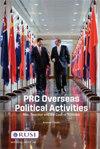II. The Rise of Gulf–Asian Common Strategic Interests
Q4 Social Sciences
引用次数: 0
Abstract
While the relationship between the GCC and Western countries began to decrease economically and politically, the region increasingly attracted energy-hungry Asian powers – primarily China, India, Japan and South Korea – looking for oil and gas resources required to sustain their growth. Researchers have acknowledged this shift of energy markets towards Asian economies, but so far have tended to downplay its political meaning by focusing on its purely economic logic and modest strategic dimension. Two legitimate arguments are highlighted in the scholarship. First, as the previous chapter underlined, in the near future the network of US military bases in the Gulf is unlikely to be dismantled, and defence agreements with Washington will continue to shape the security policies of GCC members. Second, Asian countries appear reluctant to develop a geopolitical posture far from their territories. Although strategic thinkers in Washington continue to support the political gain of US global commitments, there is no such ambition in India or China. The former remains trapped in its local conflict with Pakistan and seems unable to project power at the global level, while the latter insisted until recently on the purely economic nature of its diplomacy – the so-called ‘China’s peaceful rise’ – to tone down speculation of Chinese hegemonic aspirations. Because of their inability or their unwillingness to play a global role, those countries were therefore portrayed as ‘free riders’,2海湾-亚洲共同战略利益的崛起
虽然海湾合作委员会与西方国家之间的关系在经济和政治上开始减弱,但该地区却越来越多地吸引着渴求能源的亚洲大国——主要是中国、印度、日本和韩国——寻求维持经济增长所需的石油和天然气资源。研究人员已经承认能源市场向亚洲经济体转移,但到目前为止,他们倾向于淡化其政治意义,只关注其纯粹的经济逻辑和适度的战略层面。有两个合理的论点在学术研究中得到了强调。首先,正如前一章所强调的,在不久的将来,美国在海湾地区的军事基地网络不太可能被拆除,与华盛顿的防务协议将继续影响海湾合作委员会成员国的安全政策。其次,亚洲国家似乎不愿在远离本国领土的地方发展地缘政治态势。尽管华盛顿的战略思想家们继续支持美国的全球承诺带来的政治利益,但印度和中国却没有这样的雄心。前者仍然受困于与巴基斯坦的局部冲突,似乎无法在全球层面投射力量,而后者直到最近还坚持其外交的纯粹经济性质——所谓的“中国和平崛起”——以淡化对中国霸权愿望的猜测。由于这些国家没有能力或不愿发挥全球作用,因此它们被描绘成“搭便车者”,
本文章由计算机程序翻译,如有差异,请以英文原文为准。
求助全文
约1分钟内获得全文
求助全文
来源期刊

Whitehall Papers
Social Sciences-Archeology
自引率
0.00%
发文量
12
期刊介绍:
The Whitehall Paper series provides in-depth studies of specific developments, issues or themes in the field of national and international defence and security. Published three times a year, Whitehall Papers reflect the highest standards of original research and analysis, and are invaluable background material for policy-makers and specialists alike.
 求助内容:
求助内容: 应助结果提醒方式:
应助结果提醒方式:


